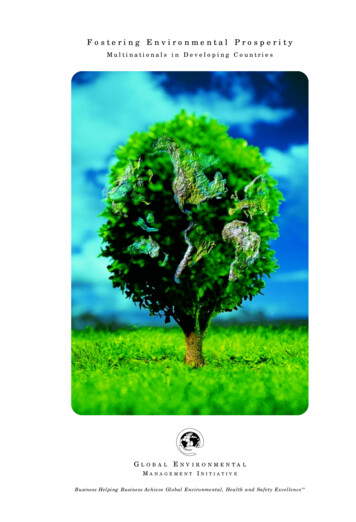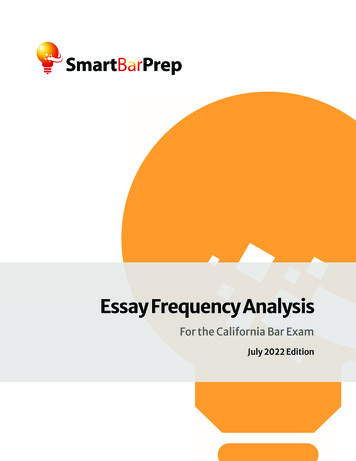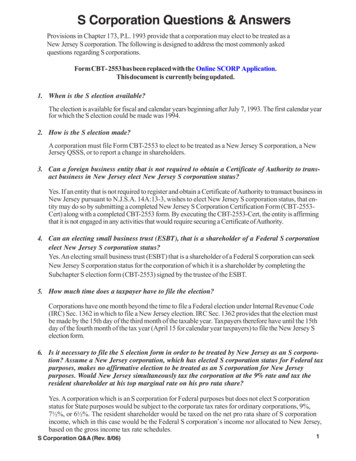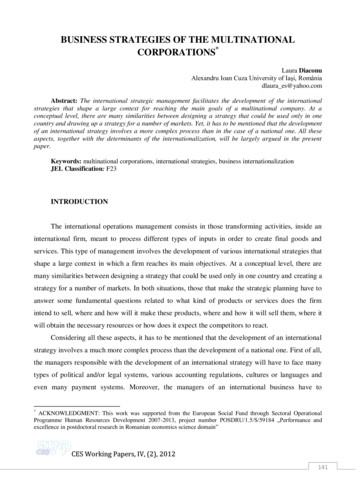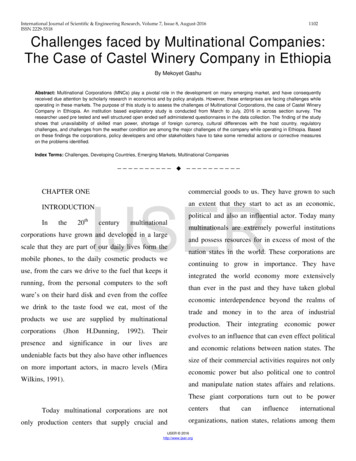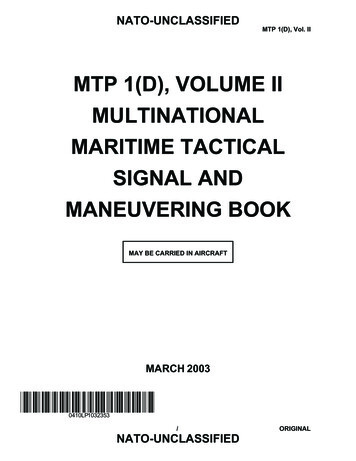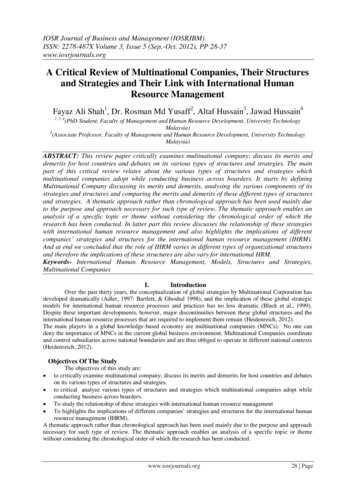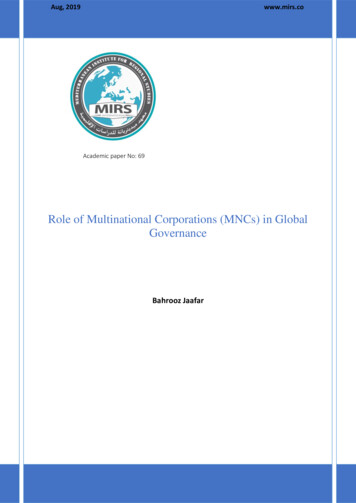
Transcription
Aug, 2019www.mirs.coAcademic paper No: 69Role of Multinational Corporations (MNCs) in GlobalGovernanceBahrooz Jaafar
Role of Multinational Corporations (MNCs) in Global Governance2019Mediterranean Institute for Regional Studies –MIRS- is a non-governmental center,which dedicated to research on and about oil, natural gas and water resources. It also engagesin geopolitical, local, national, regional and international issues, the institute will providedetailed research and analysis on the mentioned topics. It also endeavours to lead andparticipate in public policies through scientific researches, analysis, debates and conferences.Furthermore, its target is to contribute to peace, prosperity, peaceful coexistence tolerance ina region riddled with war, conflict and sectarian tensions. The institute publishes articles andresearch in English, Arabic and Kurdish languagesCyprus, Nicosia, Haspolat. CIU, 00905338601514Address: Iraq- Sulaymaniyah- Salm Street. Rzgari- Opposite Ashti Sport Club,Email: Info@Mirs.co , Web: www.mirs.co , 00964(770)1382323MIRS ‘s Academic Paper:Role of Multinational Corporations (MNCs) in Global GovernanceBahrooz Jaafar, Head of Mediterranean Institute for Regional Studies, Ph.D student InternationalRelations at Cyprus International University1
Role of Multinational Corporations (MNCs) in Global Governance2019INTRODUCTIONGlobal governance is a dynamic occurrence in the current globe as it is changing inrules and legitimacy, increasing in the number of actors that participate in global governance(Finkelstein, 1995). Good global governance cuts beyond the borders of state. This is becausethe Westphalia state system has taken a from that is different from the interstate relations assuch relations has limitation with regards to the growing number of non-state actors and nonstate centered problems. This collective problem hence requires a more expanded solutionthat will involve governments and public as well as private sectors.Hence, the private sector can create regulations among themselves in line with thesolution provided by the state. Hence private and public are complimenting each other in theglobal governance terrain; the nation-state, the civil society, Multinational corporations areparticipants in global governance (Karns and Karen, 2004).Over time, the focus has shifted from the nation-state to expansive area of non-stateactors such as the international non-governmental organizations (NGO) and internationalinstitutions, multinational corporations and local NGOs. All these actors have become asignificant participant in global governance (MNC) (Detomasi, 2007). The diversity of theactors also reflects that they will be playing several varying but integrated roles thatcontribute to global governance. Such as rules setting, advocacy, foreign direct investmentwith regards to capital and labor regulations and policy development.All these point to a globalizing world that needs to be regulated. ‘This is because theworld has experience lots of economic crisis, humanitarian crisis and environmental crisisthat goes beyond the control of national government. Therefore the MNCs have to synergizewith national government to bring about good global governance. Although, the activities ofMNCs that bring about problem which is to be address through global governance asenormous, their contributions cannot be overstated. Hence this study begin with the briefexplanation negative impact of MNCs, brief discussion of the positives impacts of MNCs andconcludes with the role of MNCs in the current global governance framework’ (Haas, 2004).2
Role of Multinational Corporations (MNCs) in Global Governance2019HOW MNCs OPERATE WITH GLOBAL GOVERNANCEThe economic crisis of 2008 reflects how the MNCs unethical conduct affects theinvestment of all investors in the mortgage sector. The individual managers of companies likeLehman brothers and insurance companies that carter for s wide range of MNCs including theAmerican stock exchange place the global economy in a state of financial crisis. If theheadquarters of these companies in America faces crisis, its affects the other branch aroundthe world and ultimate the global economy reaches the brink of collapsing (Varghese, 2009).Humanitarian crisis have also be identified as one of the problems that comes withglobalization there by making the need for good global governance (Schwartz, 2011). Theactivities of MNCs that include escaping from locations of high labor standards and movingto locations with low labor standard has resulted in the humanitarian crisis such as the use onchild labor and the violations of human rights in the production of certain goods. For examplethe supply cobalt that is used to make the battery of cell phones have is found to be exploitedfrom an environment that does not have appropriate human protections.MNCs also go to this kind of place to get supply because of the cheap cost andthereby violate the standards. Even in the supply of ammunition around the world, MNCsinvolve in producing these weapons do not see as a problem to supply rebels with guns thataid the continuity of many wars and crisis. Bringing it closer, Coca cola violates workers’rights in Columbia while oil and gas companies struggle to keep the environment unpolluted(Benner, Reinicke and Witte, 2004).Environmental hazards are one of the problems that MNCs creates as they global. Itcould be argued that as they globalized, they create a global environmental problem thatneeds a global solution. The emission of carbon into the air is an area where the governmentand the MNCs try to address as it is creating the climate change problem. The activities of theMNCs are what also participate to these problems hence they have a role to play in bringingabout good global governance (Ougaard, 2010).Despite all these negative impacts, the Multinational Corporation (MNCs) is one ofthe major actors that are shaping a prosperous globalization. The MNCs through the foreigndirect investment (FDI) bring about a lot of ‘positive impact’ around the world. First, it bringas about development in the new locations or branch or franchise that is opened around the3
Role of Multinational Corporations (MNCs) in Global Governance2019world. This is a form of integrating a local economy into the global economy. The productiontaking place in host country and exported to another country is an example of suchinterconnectedness.There is presence of infrastructural development that helps a developing countries tobe competitive in the global economy when a MNCs moves into the country. Theconstructions of some railway lines were a product of the corporation’s establishment in thesecountries. Also ‘the FDI provides employment for the locals in the countries. Somedeveloping countries create a policy that state a quota of local employment for MNCs therebyreducing the unemployment in those countries. Also the capital flow into the locations helpsthe host country’s currency to boisterous. Amidst all of these are the charitable activities ofthe MNCs as a form of corporate social responsibility on a large scale’’ (Globerman andShapiro, 2002).After laying the background of the positive and negative influence of MNCs, thisarticle proceeds to explain the role of MNCs in participating in good global governance. Themain role focus in this article is the way MNCs shape the global rules, norms and institutionsas well as international regimes in bring out global governance.HISTORICAL DEVELOPMENT OF ROLE OF MNCsSince the period of industrial revolution, there have several innovations that help tobegin to recreate the international environment. The production process which increasedmade it possible for companies to seek markets beyond their territory and this has beenhelped by the state support or running of these companies. Examples of such companies arethe East India companies. These companies are example of MNCs however hundred yearsago. The English and Dutch supported the companies to fulfil their economic needs.Nevertheless there are some elements found in globalization that are found in the activities ofsuch companies. ‘’The operation of these companies where beyond the one geographicalareas; the labour is from the locals but foreign control or management. It reflects a form ofroles that each geographical region plays, This serves as a model for today’s MNCs as theyare being used for the pursuance of both state and private interests’’ (Williamson, 1991). Asthese corporations continues to pursue such interest beyond the geographical region wherethey have been established; they instigate interconnectedness which is linked to globalization4
Role of Multinational Corporations (MNCs) in Global Governance2019and requires a global governance measures. These elements can be used to trace the modernday forces of globalization which are linked to liberalization and privatization (Scherer,Palazzo and Matten, 2009).In a contemporary sense, global economy transiting the borders of state makes everyother company wants to engage in competitiveness. Unlike those older corporations that arewell state propelled, the contemporary MNCs are privately owned. Hence there has beenincrease in the existing number of MNCs in the twenty-first century. They are expandingtheir markets and technological advance and spreading both political and ideological ideas.Therefore, the role of MNCs in political, economic, legal and society terms is continuing toincrease (Li, 1995).RULES CREATOROne of the roles MNCs play is that linked to the understanding of global governance.Global governance is perceived as the making and implementation of rule by state and otheractors beyond the state ‘’transnational actors, multinational actors and civil society’’regarding the management of varieties of aspect in the international society’ (Braithwaite andDrahos 2000). MNCs participate in the creation of rules and policies that affects their area ofoperation even in areas that were mainly the responsibilities of the state. For example theMontreal protocol on environment was mainly between states however it is the MNCs thatare directly emitting the carbon but the implementation of the policy is mainly on the side ofthe MNCs.The protocol is pushes the state making sure that their chemical, electrical and gasindustries stop their greenhouse gas emissions in the course of their production. There havebeen emission cuts and control of air pollution at least to a monitoring level. This is takingplace between the MNCs, Nation-States and United Nations. For example there is the UnitedNations framework on Convention on Climate Change which addresses the emissions in ofState corporations.In furthering the discussion of responsibility or role of MNCs, Habermas provides anargument that firms participated to the stable function of the society Habermas (Habermas,1998). This can be referred to as that MNCs create a form of stable at the global level. Thisis carried out through the growing global company alliances.5
Role of Multinational Corporations (MNCs) in Global Governance2019So, Wars are evidently a situation where government involve in interventioniststrategy to redirect the economy to fulfil the needs of the war. During the cold war, this wasobvious on the two camps. Despite the challenges that emerged out of the AmericanJapanese relations, the MNCs managements in both countries still continue to build businessalliances. This is a form of corporate state of interdependency and competitiveness. Throughsuch alliances, the national tension is more eased therefore creating stability.Such alliances are more common among the science field. The science andtechnology aspect have been favored with regards to the international alliance andcollaboration. Although there are still constraints with regards to exchange of technologyamong engineers as a result of the national security and national economics. ‘‘Without anyform of alliance the problems of world peace and security will not be full solved since thescientist are the ones involve in the creation of nukes and weapons of mass destruction.Hence humans will be at risk, therefore the relationship that takes place amongst MNCs thatproduces materials used for such production helps to regulate the production and use of suchmaterials that threatens the life of humans’’ (Hale et al, 2011).THEORISING AND INTERTWININGIn general, Global governance such as international institution, IGO, INGO, MNCscoming to make opportunity, facilitate, and contributing to find resolves for problems thatfaced the international and regional arena. Right there are states, but also there are thousandsof issues which created and obstacle in front of humanity and international community, suchas: Poverty, terrorism, climate change, pollution, desertification, social and economicinequality and so on, which all these problem became an international topic that we need tonaming and analysing in international politics. The simple inquiry is who resolve theproblems, how?During the end of the Cold War (1989) there were shifted worldwide into maindirections, such as occurred the transformation European Economic Community to EuropeanUnion, collapsed Soviet Union, and emerged neo-realists, it was caused to open the worldand spread flow of companies, organization in all the world. In parallel there were establishmore and more institutions, that’s why their emerged theories/theorists to explain all thephenomena. Here, realists believe that the state is the epicentre of things cannot be share6
Role of Multinational Corporations (MNCs) in Global Governance2019power between state and non-state actors. The liberal said that the key point is not state weneed to share power between state and corporations in order to provide more opportunity anddemonstrate the economic marketing. As well as structural realism defined internationalstructure by ‘its allocation of capabilities, ordering principle an anarchy’’, structuralismwithin the frame of neorealist highlighted the role of state and activities as a logic to self-help(Brown, D. Mahler, R, Anne. Vetterlein, A, 2009: P 6-10) means states only seek to keeptheir own interests, states not being to promote and protect transnational companies.NORM ENTREPRENEURSMNCs also are trying to survive independently of the country in which they operate asa result they bring out new norms that favors them in host countries. They do not onlyconsider the interest of their state of origin but also tries to pursue their own means ofsurviving while fulfilling the role of being a good global citizen in the host country. Severalscholars have argued that the MNCs are private sector who is setting standards of operation’(Hall and Biersteker 2002).This include initiating and sponsoring global campaigns such as the UN global impact.This is a platform of interaction among MNCs and the United Nations with regards to thecreation and implementation of global norms and values in the aspect of labor, human rightand environment; these are found in the MNCs operational code. As well as, a means to fightagainst corruption, within the global reporting initiative, the MNCs are able to set up or be apart of the agencies that look into such matters that transcend beyond the borders of state.Within this framework, individual organizations such as Wolfsburg group are examples ofthe private regulatory innovators of the global reporting initiative. ‘Their focus is on theregulatory system of global banking that help to curb the money laundering aspect. Theyprovide guide and documentation that will reveal the tendencies or movement of illegal fundtransfer within the global banking sector. This is an anticorruption strategy from the MNCsinitiatives’. (Pieth and Aiolfi, 2003).7
Role of Multinational Corporations (MNCs) in Global Governance2019DEMOCRACY AND CAPITALISMThe MNCs in the context of ideology is compatible with democracy because they arecapitalist organization. Hence is global governance, it is key to state that they will bepromoting not only capitalist ideologies but also democratic ideologies of global governance.It is key to recognize that democracy has spread wide enough but the legitimacy of itsoperations are still being questioned by some other parts of the world. Hence with the MNCs,democratic and capitalist global governance is being promoted to ensure smooth running ofthe MNCs in any environment they find themselves’ (Cutler et al, 1999).The democratic values will include freedom of speech, freedom from fear and otherinalienable rights of human, as well as freedom of press in any environment of theiroperation. This will mean that any atmosphere with limitations and constraints on those rightswill not attract MNCs. For instance we can look the case of ‘Khashoggi’, several MNCs andinternational business alliance discontinued their current negotiation with Saudi Arabia as aresponse to the undemocratic behavior towards the press (Basu, 2018). It does not onlythreaten the press but threaten the MNCs as well because if government can interfere andattack media, the MNCs are not safe. In the way the MNCs seek good global governance andaccountability from governments that are even beyond their own original state.An historical case is the ‘Shell’s case’ in its area of operations. Shell basicallyengages in oil spillage in the localities where it operates. The environment is destroying andthe inhabitants of those places are at risk of not only losing their livelihood such as fishingbut also losing their lives from the burning of fuel. This case of Shell brought about the needfor standardization with regards to the operations of MNCs of which shell adhere to in orderto bring about good governance in the host country,‘ The problem is that host country,especially when it is developing countries in Africa; always focus on the profit or evenbribery from MNCs like Shell. Some MNCs has operated under a military junta just like shelldid in Nigeria. However the story has changed as globalization continues to increase andexpand with transparency of the deeds of both government and MNCs. MNCs now ensureinitiation and implementation of the standards of operations in these areas’ (Kell and Levin,2003).8
Role of Multinational Corporations (MNCs) in Global Governance2019Moreover, MNCs carries a huge responsibility in dealing with the case of reframingfrom bribery actions that have been previously perceived as acceptable with the norm of theenvironment where they run their businesses (Fuchs, 2007). As globalization continues, thestandards of MNCs actions of state have been questions and reinvention of new standardshave taken place however yet to be spread.One of the roles of MNCs is to spread the standards and ensure compliance.Although there could have been other actors such as the civil society and non-governmentalorganization that have brought about certain norms that should be promoted in theinternational environments, MNCs have the capital to spread the norms compared to bothstate and civil society actors. This is because the ability to reach the globe through MNCs isfar wider than that of state actors. Also the capital requirement of promotion of such normsbarely could be catered for by state actors hence MNCs is able to bear the burden easily thanstate. Example at the United Nation global impact campaign earlier stated. So, state ofinternational Non-governmental organization could initiate or talk about a norm, the MNCssponsors the norm and becomes a policy entrepreneur (Reith and Zimmer, 2004).EMERGING ROLES OF MNCSAs considering the continuous globalization that is taking place, there are futurechallenges that that will require more roles of MNCs. This will be more observable in thetechnology aspect as people are depending more and more on the information technology tosolve problem rather than state actor. For example of such areas a medicine wherePharmaceuticals that run across different countries need to supply drugs that are needed in theoutbreak of diseases. These sort of MNCs are research oriented although the work withcountries to be able to have legitimacy. As globalization continues to take place, there ispossible of the outbreak of new diseases that will call for the attention of this kind of MNCshence they serve as leverage for the future (Levy and Prakash, 2003).One more aspect of the need of MNCs in the future is the aspect of environment. Thedepletion of the environment that continues and the climate change will need more actionsfrom the MNCs because they economy of most States are tied to the manufacturingindustries. However, global environmental challenges can also cause the lack of food andother resources that aid human to survive. Basically it would mean that state economy will9
Role of Multinational Corporations (MNCs) in Global Governance2019continue to prosper at the detriment not the environment and the human that exist in the state.MNCs need to develop technologies that will aid the management of waste and energy hencethe science field and the political field overlaps. One could argue that it is through goodglobal governance that these two fields interrelate more in the future. The development ofnew means of recycling that will keep the environment clean is also a role the MNCs isplaying and should play in the future’ (Schorlemer, 2003).CONCLUSIONIn relations to global governance, MNCs continue to join the creating good globalgovernance despite any negative or positive impact of their activities. MNCs existing overtime show the significant role they have played to bring about globalization. But the need forgood global governance is crucial. Hence they play the role of rules creator, normentrepreneur in other to establish global standards of operation both in the economic aspectand the political aspect. The also promote democratic and capitalist ideologies as they operatesolely in an environment that is perceived to be free and fair. The future role of MNCs inglobal governance will point towards the medical and environmental aspect which the nationstate cannot solely address. Irrespective of the nationalization of certain industry in somestate, there is a great role the MNCs will play in address such issues because of the widerreach they are having when the invest in several countries.10
Role of Multinational Corporations (MNCs) in Global Governance2019REFERENCES1. Basu, Zachary (2018), ‘’The companies who have backed away from Saudi businessover Khashoggi’’. Assessed from f2-2ea8998d5fe2.htmlRetrieved on 04.12.20182. Benner, T., Reinicke, W. H., & Witte, J. M. (2004). ‘’Multisectoral Networks inGlobal Governance: Towards a Pluralistic System of Accountability1’’. ‘’Government and opposition, 39(2), 191-210’’.3. Brown, D. Mahler, R, Anne. Vetterlein, A ( 2009), ‘’Theorising TransnationalCorporations as Social Actors: An Analysis of Corporate Motivations’’. InternationalCenter for Business and Politics, Copenhagen Business School. P: 6-104. Braithwaite, J., & Drahos, P. (2000). ‘’Global business regulation’’. Cambridgeuniversity press.5. Cutler, A. C., Haufler, V., & Porter, T. (Eds.). (1999). ‘’Private authority andinternational affairs’’. Suny Press.6. Detomasi, D. A. (2007). ‘The multinational corporation and global governance:Modelling global public policy networks. Journal of business ethics’’, 71(3), 321-334.7. Finkelstein, L. S. (1995). What is global governance. ‘’Global governance’’, 1, 367.8. Fuchs, D. A. (2007). Business power in global governance. Boulder, CO: LynneRienner.9. Fuchs, D. A. (2007). Business power in global governance. Boulder, CO: LynneRienner.10. Globerman, S., & Shapiro, D. (2002). ‘’Global foreign direct investment flows: Therole of governance infrastructure. World development’’, 30(11), 1899-1919.11. Haas, P. M. (2004). ‘’Addressing the global governance deficit. Global environmentalpolitics,’’ 4(4), 1-15.12. Habermas, J. (1998). ‘’Habermas on law and democracy: critical exchanges ‘’(Vol.5). Univ of California Press.13. Hall, R. B., & Biersteker, T. J. (Eds.). (2002). ‘’The emergence of private authority inglobal governance ‘’(Vol. 85). Cambridge University Press.14. Karns, M., & Karen, M. (2004). ‘’The politics and processes of globalgovernance. Colorado: Lynne Rienner Publishers’’.15. Kell, G., & Levin, D. (2003). ‘’The Global Compact network: An historic experimentin learning and action.’’ Business and Society Review, 108(2)’’, 151-181.16. Levy, D. L., & Prakash, A. (2003). Bargains old and new: Multinational corporationsin global governance. Business and Politics, 5(2), 131-150.17. Li, J. (1995). Foreign entry and survival: Effects of strategic choices on performancein international markets. ‘’Strategic management journal, 16(5), 333-351’’.18. Ougaard, M., & Leander, A. (Eds.). (2010). Business and global governance.Routledge.11
Role of Multinational Corporations (MNCs) in Global Governance201919. Pieth, M., & Aiolfi, G. (2003). The private sector become active: the Wolfsbergprocess. Journal of Financial Crime, 10(4), 359-365.20. Rieth, L., & Zimmer, M. (2004). Transnational corporations and conflict prevention:The impact of norms on private actors.21. Scherer, A. G., Palazzo, G., & Matten, D. (2009). The business firm as a politicalactor: A new theory of the firm for a globalized world. Business & Society, 48(4),577-580.22. Schwartz, M. (2011). ‘’Military neoliberalism: Endless war and humanitarian crisis inthe twenty-first century. Societies without Borders’’, 6(3), 190-303.23. Varghese, N. V. (2009). Globalization, economic crisis and national strategies forhigher education development. International Institute for Educational Planning(IIEP) Research Paper, UNESCO. Paris: IIEP.24. Von Schorlemer, S. (2003). ‘’Human rights: substantive and institutional implicationsof the war against terrorism. European Journal of International Law’’, 14(2), 265282.12
investment of all investors in the mortgage sector. The individual managers of companies like . as about development in the new locations or branch or franchise that is opened around the . Role of Multinational Corporations (MNCs) in Global Governance 2019 4 world. This is a form of integrating a local economy into the global economy.

